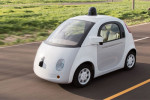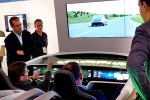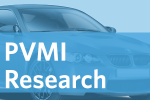
Discussing the “once in a century” transformation of the auto industry, including electric and autonomous vehicles, data and AI, and global supply chain issues…Read More

Discussing the “once in a century” transformation of the auto industry, including electric and autonomous vehicles, data and AI, and global supply chain issues…Read More

In his Forbes column debut, PVMI Director John Paul MacDuffie examines Apple’s moves in vehicle development, Tesla’s business model, the dynamics between tech and automotive companies, and more.…Read More

Mobile and Internet-of-things (IoT) devices increasingly enable tracking of user behavior, and they often provide real-time or immediate feedback to consumers in an effort to improve their conduct. Growing adoption of such technologies leads to an important question: “Does immediate feedback provided to users improve their behavior?”…Read More

Zendrive CEO Jonathan Matus shares how smartphones can make us better drivers and how other stakeholders benefit from Zendrive’s platform.…Read More

CTO Mitch Berg talks about how the online marketplace for buying and selling used cars is tapping into a space long owned by mom-and-pop retailers.…Read More

Dr. Venkatesh Prasad, Ford’s “What’s Next” guy, describes how Ford is taking on new trends like autonomous cars, new energy sources, and shared ridership.…Read More

While there is overwhelming support for the negative consequences of product recalls, empirical evidence of operational drivers of recalls is almost nonexistent. In this study, we identify product variety, plant variety, and capacity utilization as drivers of subsequent manufacturing-related recalls.…Read More

Digital disruption is driving transformation across entire industries. Our Spring Conference 2016 examined how healthcare, transportation, and retail are adapting.…Read More

In a world where self-driving cars are the norm, will fewer people want to buy a car? Japanese automaker Nissan is looking ahead to this and other scenarios in the future of transportation.…Read More

The technology for driverless cars is advancing rapidly, but before autonomous vehicles can become a reality, cities and governments need to catch up. MBA student Michael Parent attended the Consumer Electronics Show and brought back insights on the future of urban mobility.…Read More

Analyzing the comprehensive 35-year patent data set associated with the Detroit auto cluster we confirm that innovation in clusters can increase in spite of a long-term decline in manufacturing activity. The “stickiness” of local knowledge is sustained by: (i) increasing technological specialization at the local level and (ii) growing connectedness to global centers of excellence.…Read More

This introduction to the April 2015 Industrial and Corporate Change special section establishes the context within which automotive firms cope with turbulence caused by globalization, new governmental regulations, and advances in electronics, communication, and drive train technologies.…Read More

New markets segments are a common setting for studies in technology strategy. These studies generally assume that new segments already exist, or have formed following the introduction of a product innovation by an entering firm. Thus, theory on the role of established firms in the emergence of new market segments is underdeveloped.…Read More

This study explores the reciprocal relationship between the nature and duration of competition, and innovation outcomes. We propose that the perpetually driven, reciprocal sequence of competitive action and reaction known as the “Red Queen” in evolutionary biology is a cardinal force behind the success of innovations.…Read More

We investigate the business model configurations associated with high and low firm performance by conducting a qualitative comparative analysis of firms competing in Formula One racing. We find that configurations of two business models — one focused on selling technology to competitors, the other one on developing and trading human resources with competitors — are associated with high performance.…Read More

Firms increasingly seek to use online communities as sources of ideas, innovations, and designs. However, many such open innovation efforts lack sustained participation and ultimately fail. This research sought to understand motivations to participate in a firm-hosted design community and how the nature of the design task influences sustained participation.…Read More

Some innovations are challenging to deploy because they destabilize existing technologies and value chains (systemic) as well as traditional customer preferences (disruptive). The existing literature does not provide clear guidance as to effective management methods for systemic and disruptive innovations (SDIs).…Read More

How J.D. Power III Transformed the Auto Industry Through the collection of consumer feedback on cars, J.D. “Dave” Power III revolutionized the automobile industry in 1968. In this Knowledge@Wharton interview conducted by PVMI director John Paul MacDuffie, Power discusses the founding and early years of his firm, J.D. Power and…Read More

In addition to hosting the 2013 Fall Conference with the Program on Vehicle and Mobility Innovation (PVMI), the Mack Institute also held a PVMI Researchers Meeting on November 21, 2013. Both events focused on the theme of disruptive technologies and value migration. In this guest blog post, PVMI veteran Dan Whitney of…Read More

The Mack Institute hosted its annual Fall Conference on November 22, 2013 with the Program on Vehicle and Mobility Innovation (PVMI) on the topic of “When Disruptive Technologies Meet Integrated Systems: Who Captures the Value?” This guest post by three PVMI researchers summarizes key takeaways from the conference, including the…Read More